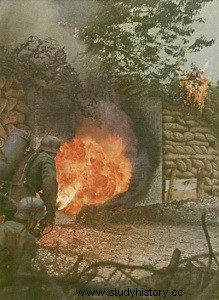
The STAVKA ordered the command of the Crimean front to withdraw its forces to the Turkish rampart, to install a stable defense there. But the enemy succeeded, on May 11, in surrounding part of the front forces near Ak-Monay. On May 15, he occupied the city of Kerch.
During this period, the German air force flew about 1,800 sorties per day.
The High Command The Soviet Union had no other solution than to withdraw the forces of the Crimean front from the Kerch peninsula. Between May 15 and 20, they therefore crossed the Kerch Strait to the Taman Peninsula and Cape Tchouchka, in extremely difficult conditions. The enemy inflicted heavy losses on them both at the embarkation and disembarkation points and during the crossing itself. There were more than 86,000 men evacuated, including 23,000 wounded. Some formations and units of the Crimean front failed to reach the Taman peninsula and remained there, where they organized partisan detachments in the stone quarries of Kerch and continued to fight heroically against the invader.
The collapse of the Crimean front in the spring of 1942 was extremely serious. In the month of May alone, this front lost 176,000 men, and many Red Army unit commanders perished in the battles on the Kerch peninsula. The Germans seized almost all the equipment and heavy weapons of the Soviet forces and later used them against the heroic defenders of Sevastopol.
The fundamental reason for the failure of the Crimean front was explained above all by the inability of the command of the front and the representative of the STAVKA (the army commissar Mekhlis) to organize first the defense against the German forces, then the evacuation of the peninsula. Because of the incompetence of the command of the front, there was no more cooperation between the armies than between the land and air forces. The latter were moreover dispersed and acted without any reference to the general plan of operations. The front commander, his staff and the representative of the STAVKA gave orders without taking into account the situation, without knowing the real state of the forces and, what is more, gave them very late. They also had no personal contact with the troops and, during the critical days of the defensive operation; precious time was wasted in numerous and sterile meetings of the military council of the front, when what was simply needed was an operational and precise direction.
Mekhlis was certainly the main culprit of the disaster on the Kerch peninsula. He did not live up to his task as a representative of STAVKA; he did not know how to carry out in time the order to withdraw the forces of the Crimean front on the Turkish rampart. In addition, he had cavalierly encroached on the functions of the front commander, had replaced him and had given missions to the various forces without taking into account the real situation. STAVKA had to dismiss Mekhlis from his post as deputy people's commissar of defense and head of the main political directorate of the Red Army. The front commander and his "delegate to the military council" were also dismissed and demoted.
